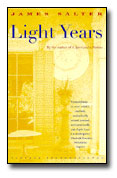Books |
James Salter: Light Years
By
Published: Oct 01, 2014
Category:
Fiction
Guest Butler Pamela Erens won the Ironweed PressFiction Prize for The Understory. Visit her at her site.
Joe Fox, a legendary editor at Random House, was once asked which of the books he worked on would be called “great” long after their reviews were compost. There were two, he said. One was “In Cold Blood,” by Truman Capote. The other was James Salter’s novel, “Light Years.”
When “Light Years” was published in 1975, Salter had written a few short novels (most notably A Sport and a Pastime) and a number of screenplays (the best known: “Downhill Racer,” for Robert Redford). He would go on to focus on short stories, in collections like Dusk and Last Night. He’s written a memoir, Burning the Days. With his wife, he published Life Is Meals, a delightful chronicle of their love of entertaining. In his 88th year, he published his longest novel, All That Is.
Salter has a great reputation, and “Light Years” is considered his masterpiece. That is, now. At publication, a New York Times reviewer called the main characters "insulting to our patience and our expectations." Another said the novel was “overwritten, chi-chi and rather silly.” Reviews like that do not boost sales. That was then. [To buy the paperback of “Light Years” from Amazon, click here. For the Kindle edition, click here.]
What is the book’s appeal? We identify with the husband and wife whose story we follow here because they want what we want: to experience life to the fullest. That identification deepens because, like most of us, they’re not quite sure what "life" consists of. Is it the enjoyment of fine goods — expensive tailoring, a pony in the back yard? Is it profound sexual connection? Is it family and the love of one’s children? The dedicated pursuit of an art? Fame, or what one of the characters calls becoming “central to the human family”?
We meet Nedra and Viri in the early 1960s, when they are twenty-eight and thirty. They have two young children, both girls. They live in a big house on the Hudson. They have affairs, watch their daughters discover their own sexuality, travel, age. There are luxurious afternoons at the beach, visits with arty friends, children’s birthday parties, shopping excursions. Nedra and Viri’s marriage strains, threatens to break up, does. The book is an accumulation of brief scenes, moments in time. The plot is merely the plot of existence.
Yet, most mysteriously, there is a feeling of high suspense. Nobody does the mini-scene like Salter; he conjures a deep mood, rounded characters and a fully developed sense of time and place in just a few hundred words. He gives us both the surface and what roils under it. The suspense is no less than the suspense we each feel about our own dearly-held existence: Will I ever feel satisfied? For how much longer will I be vital and beautiful? Will I have a good death?
Death, as it happens, is always skulking around the edges, stealing away a neighbor child, a parent, an old, dear friend. As the novel drew toward its close, I began to turn the pages more and more slowly. I realized that I was in prospective mourning: If one of these fabulous, flawed creatures should die!
To read James Salter is to be pushed around a bit — not by his subject matter, which is after all just familiar news from the front lines of life — but by his powerful narrative voice. Salter’s narrator is a God who sees into and around everyone and everything. He says things like, "There are faces that subjugate one" and "Long sleepers are usually nonconformists; they are pensive and somewhat withdrawn."
Either you surrender to this authority or you resist it. If you resist, you miss all the irreplaceable Salter pleasures: the compression, the clean, hyper-vivid descriptions, the flawless ear, the humor (often overlooked by cranky readers ticked off, perhaps, by the fact that Salter’s characters are smarter, more elegant, and wealthier than the rest of us). I, for one, am happily enchanted by lines like this one, about a family man having an affair: “He is shuttling between one happiness and another.” Or this, about an enormous stuffed bear that Viri gives to his younger daughter for Christmas: “He was a present that rich children get and ignore the next day, the present one remembers always.” Salter never plunks a mug of coffee on a kitchen table. He mentions “the peel of lemon beside the empty cups.” You see the coffee anyway, but isn’t it better his way?
But even a devoted fan might quarrel with Salter. He has a thing about pointing out who’s Jewish. Then there’s that mania for bizarre names ("Viri" and "Nedra" have surely caused more than one reader to give up before page ten). But his ability to capture the complex and contradictory nature of longing and love makes these oddities forgivable.
“Light Years” is a deep and moving exploration of time and the sense of loss its passage brings. Some have called this novel depressing. I call it exhilaratingly sad.


